The Ultimate Guide for Switching to a Tech Career
You don't need another 4-year degree to jump into a tech career. There are a plethora of options and roadmaps ready to propel you into the booming tech industry.

Find advice, tools, and resources from experts to help your foray into the field of technology be successful and easy.
Since you've finally reached here, you must be scratching the surface of the possibility of tech employment for yourself.
You might be working in a non-technical job already but not satisfied with the earnings, or maybe the job itself.
Or you might be preparing for a government job and not being able to make it through.
Or let's just say everything is working fine for you but you want to get the sweet pleasure of building and solving real-world problems. Building that app that can solve a logistics problem or a platform that can make dating easier? (Of course, ideas are limitless)
Some people got on the tech bandwagon pretty early in their careers and are bearing the sweet fruits of the tech industry, while you might have had a different interest back then. You might still be making good bucks, but tech is tempting, isn't it?
Why switch to a tech career?
And why not? According to Forbes, computer and information technology operations are expected to grow by 13% between 2020 and 2030. That's a massive leap when you consider the proportions.
Here's another tempting fact- There will be approximately 62 million full-time jobs in the information & communications industry by 2023.
And as the scope rises, so do the salaries. No wonder, 7 of the top 10 high-paying jobs are associated with modern technology.
Is it possible to make a career change?
Now, you're wondering if it is really possible to transition to tech, given you come from a non-technical background.
Of course, it is. What else could be the point of writing this article?
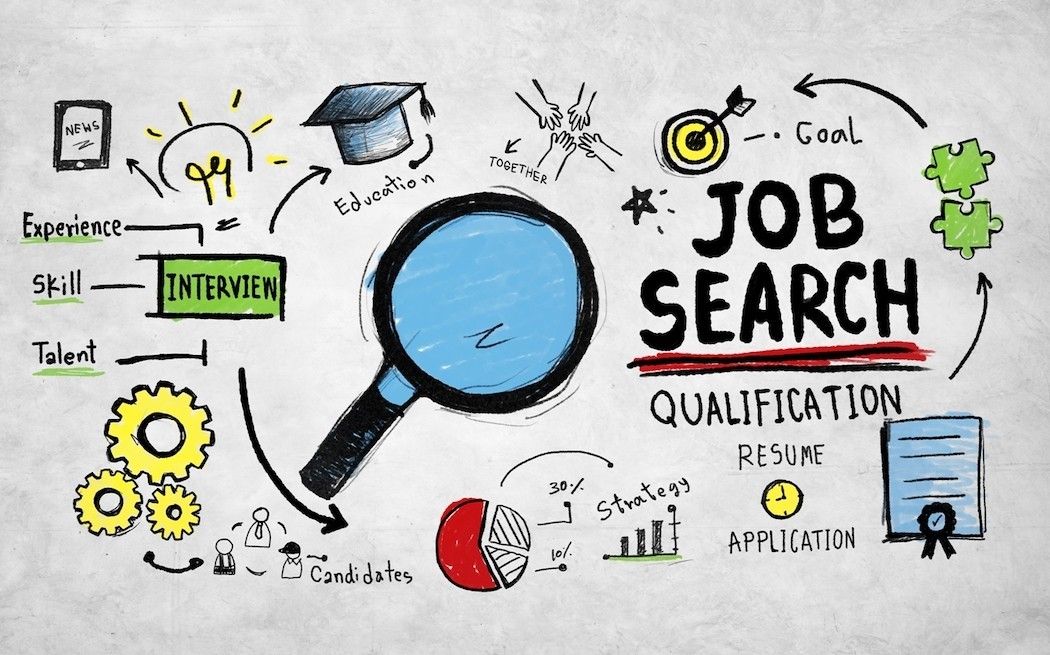
To be honest, the tech sector might seem daunting from an outsider's perspective. Those jargon words and languages and codes and databases must require lots of specialist knowledge.
Guess what! You might be underestimating yourself. Switching to tech is definitely way easier than say, switching to medicine.
We're not saying that just out of thin air. The number of people making a career shift to tech has been considerably high in recent years.
We don't even have to go that far to validate this fact, rather just look at Masai’s own alumni. Hundreds of students have successfully transitioned into tech from various backgrounds such as commerce, arts, civil, chemical, and even hospitality. (Here are 10 of those outliers, in case you want to know)
If they could walk past this hurdle in just 7 months, so can you.
Yes! You don't need another 4-year degree to jump into a tech career. There are a plethora of options and roadmaps ready to propel you in the world's favorite sector today i.e. technology.
Apart from the obvious salary benefits, there are immense learning opportunities in the tech industry. How we have come from a room-occupying machines to palm-fitting smartphones is a miracle in itself. Next awaits the era of AI and virtual reality.
Imagine getting your feet into the fast-evolving tech and building crazy innovative solutions for the future.
On the other hand, our country is facing a demand-supply gap in tech employment in the industry. No doubt, there are endless opportunities.
On that note, let's see how can you make a swift and successful transition to tech and ride the bandwagon into the future.
First, let's look at a few major career options you can pursue-
Career options in Tech
First, let's look at a few major career options you can pursue-
- Software and Application Development
- Data Analytics and Data Science
- AI and Machine Learning
- IoT Engineering
- FinTech Engineering
1. Software and Application Development: Encompassing the design, development, and debugging of application programs for a wide range of platforms, this field offers several potential specialisations within software development.
2. Data Analytics and Data Science: In this sector, extensive datasets are gathered, analysed, and interpreted by data professionals to assist organisations in making well-informed decisions. While data analysts primarily focus on descriptive analysis, data scientists employ advanced techniques to predict future trends and outcomes.
3. AI and Machine Learning: Specializing in Artificial Intelligence (AI) and Machine Learning (ML), professionals are dedicated to crafting systems capable of performing tasks traditionally reliant on human intelligence. This encompasses areas such as natural language processing, computer vision, and the development of recommendation systems.
4. IoT Engineering: Responsible for the creation and development of interconnected devices and systems communicating via the internet, engineers in the Internet of Things (IoT) realm find applications across various sectors, including healthcare, smart homes, and industrial automation.
5. FinTech Engineering: Financial technology (FinTech) engineers work on innovations in the financial sector. They create solutions such as online banking platforms, payment gateways, and blockchain-based financial products.
We'll get to know them one by one and then discuss the process to make that switch.
Software & Application Development
No wonder why websites and application software are the first things that come to mind when we think of tech.
We wake up and work out with some app, order food & groceries from an app, work on various software like Excel, and PowerPoint, browse multiple websites, check out what's trending on social media, and listen to some soothing music on Spotify, and sleep. That's our whole day summarised between software and apps.
It also happens to be one of the best and most sought-after career paths in IT, especially for beginners.
As a software developer, your role encompasses developing computer programs, operating systems, websites, and mobile applications. When you aren’t developing new programs, you’re involved in maintenance of the software, resolving bugs, etc. A good number of developers are also into servicing.
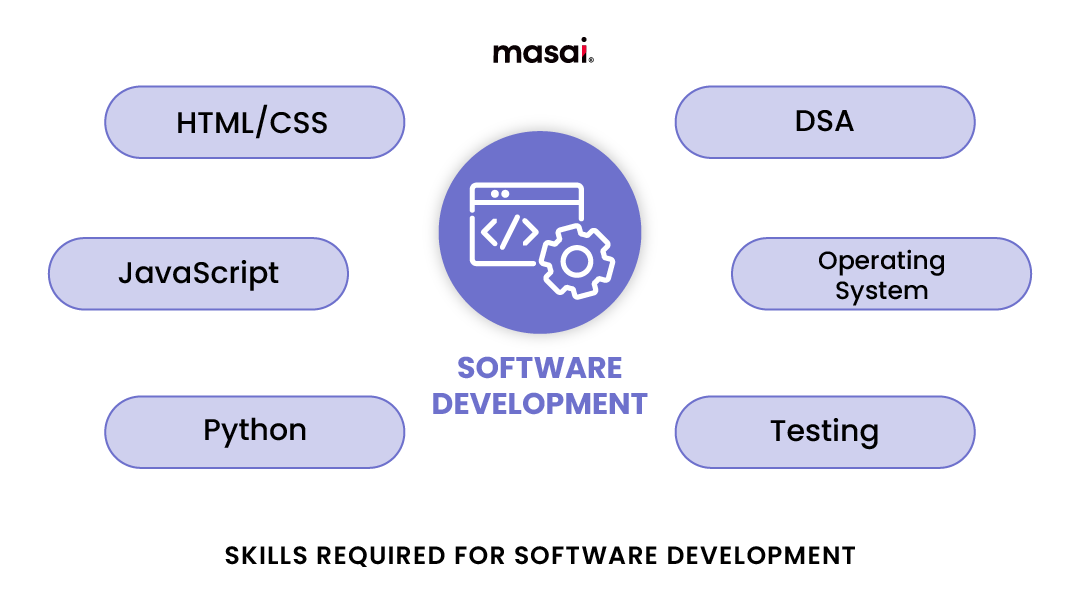
Skills required for software development
- Good hold on front-end and back-end programming languages- HTML/CSS, JavaScript, PHP, Python, C#, etc.
- Basic understanding of data structures and algorithms
- Understanding of databases, networks, and operating systems
- Good experience with different testing methods
Some popular coding languages to learn are listed below:
JavaScript: This choice aids programmers in creating an interactive online application, such as a webpage that shows certain information once a user clicks on a button.
Python: This choice is a versatile programming language that enables you to carry out a variety of software development jobs, such as developing code for a full program or identifying language faults. It may be simpler to learn than some alternatives because of its straightforward format.
C: This programming language can assist you in creating software for medical equipment that maximises hardware capabilities. Since C allows for the creation of intricate gaming systems with top-notch computer visuals, it is often used by video game developers.
Java: You may construct programs and apps using this language on many computer platforms. Because Java has a framework resembling that of C, but with fewer complications, video game creators also utilise it to produce high-quality video games.
The following are three elements of software testing that developers are aware of:
Unit testing entails examining certain lines of code or sections of code to see whether they need to be modified. To ensure they test the most important components of software, developers frequently construct a unique unit test for each project they finish.
Integration testing: This procedure is used by software engineers to verify whether they can successfully combine distinct portions of a program's code. Integration testing may be used to see how the code of one software application interacts with that of another.
System testing: This procedure is usually carried out by an outside testing expert to ascertain whether a product meets user expectations once integration testing is finished.
A software developer has a long line of opportunities in several industries such as fintech, healthcare technology, video game development, etc. to name a few.
The national median salary of a software developer, according to Glassdoor was INR 7,10,000 in June 2022.
Data Analytics & Data Science
Another lucrative career in the tech industry - Data science and analytics. In fact, being a data scientist is the highest-paid job in the world right now.
If you're looking to kickstart a career in the field of data, you should start with data analytics.
Both these fields are closely related to each other and come under big data. The only difference is - where an analyst performs statistical analysis and derives meaningful insights, a data scientist designs the algorithms and predictive models used for analysis. In a way, they create the framework which analysts later use to make sense of data.
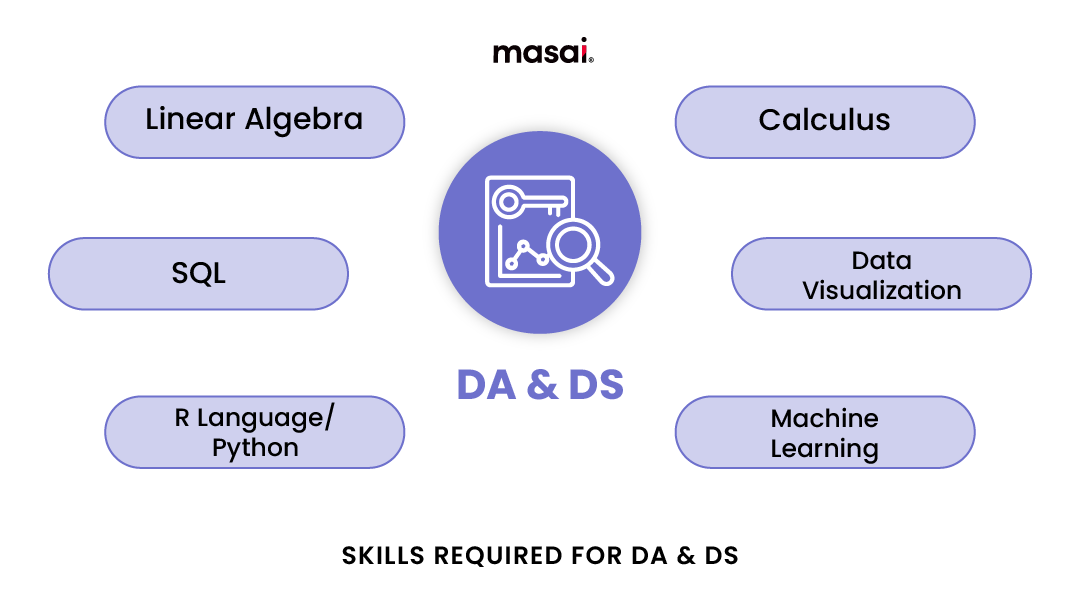
Skills required for big data
- Strong hold on mathematical skills- Linear algebra, calculus, statistics and probability
- Knowledge of coding languages such as R language or Python
- Knowledge of database languages such as SQL, NoSQL
- Data visualization & Data cleaning processes
- Critical thinking & Presentation skills
Both these roles are relatively new but growing at the fastest rates. (According to LinkedIn, they've been growing at 34% for the last 4 years).
If we talk about India specifically, the median salary of a data analyst professional lies in the 5-12 LPA range. A data scientist's salary goes higher in the range of 12-20 LPA easily.
AI and Machine Learning
'Developing systems that can learn and adapt on their own without much human instruction', is the world of Artificial Intelligence for you.
Machine learning can be considered a subset of AI. Both these roles have tremendous future potential. We can't even argue over this when we see things from mobile assistants to high-tech intelligent speakers like Siri or Alexa, and now self-driving cars. (Seriously, where are we headed?)
As AI and Machine learning specialists, you will be programming systems to collect information, analyze, and act according to the data.
Skills required
• Programming skills in Python and Torch
• Development of REST APIs - communication between servers and clients
• Experience with algorithms and related tools
• Expert mathematical skills in linear algebra and calculus
• Knowledge of signal processing techniques
• Knowledge of neural network architectures
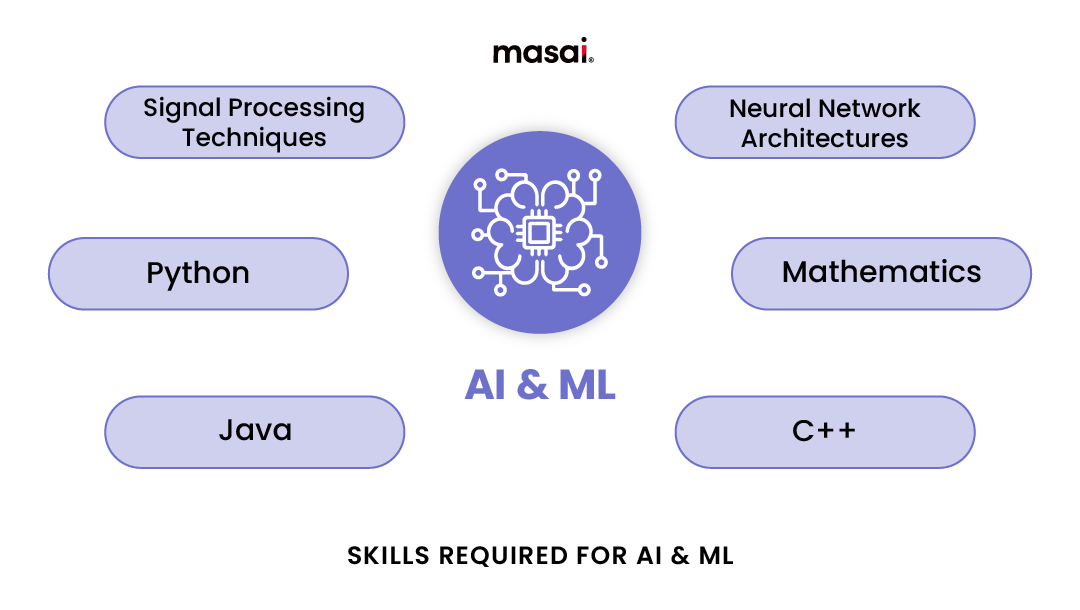
AI is the future, truly. An entry-level AI engineer starts with an average salary of INR 8 LPA, and with experience, that number can easily reach up to INR 50 LPA.
IoT Engineering
The Internet of Things has stormed into our daily lives with usage ranging from global businesses to personal healthcare, and more.
IoT refers to the network of physical objects that uses sensors, software, and other technologies to connect and exchange data with other devices over the internet. (Thermostats, smart watches, weather stations, smart pipelines, etc.)
Looking at the huge scale, a career in IoT looks as bright a prospect as the others we have discussed.
The work of an IoT engineer revolves around developing innovative programs and devices to help consumers receive, control, and manage information effectively.
They require a diverse set of skills and can only be pursued after you've mastered the other domains mentioned above.
Skills required for IoT Engineering
• In-depth knowledge of computer programming and network security
• Proficiency in AI and Machine learning
• Node.js development
• Mobile app development
• Understanding of IoT architecture
• Strong hold on Linux OS
• Understanding of data & device security
• Problem-solving and analytical skills
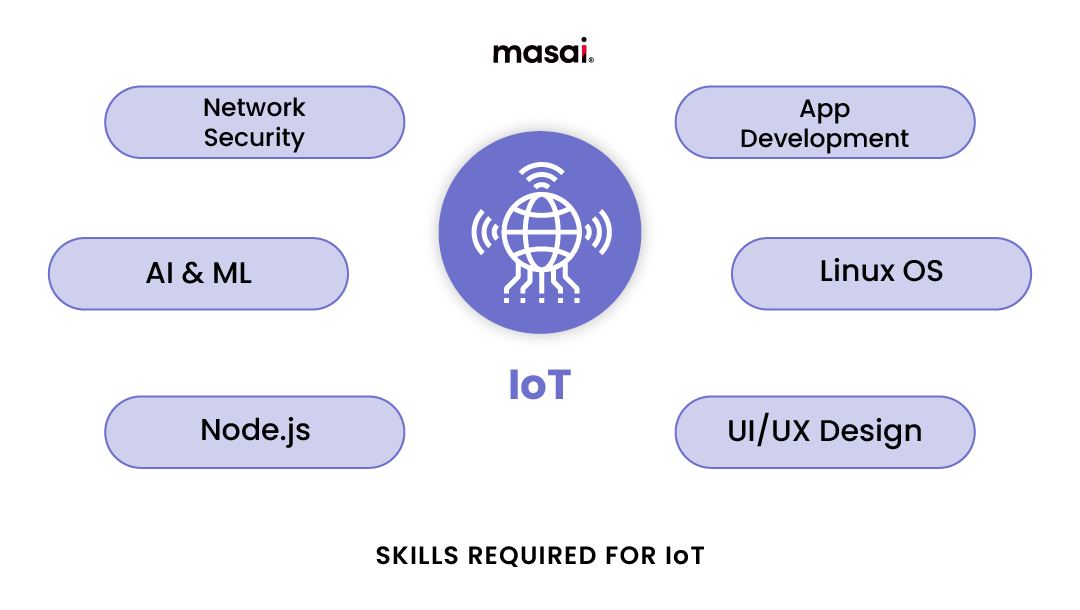
IoT development in India is still at its nascent stage but have no doubt, that it's growing by leaps and bounds. An IoT engineer, given a lesser supply of talent, earns a median salary of INR 15.2 LPA, nearly 76% higher than that of an IT professional.
FinTech Engineering
The use of fintech has completely changed how customers make purchases. It altered how people handle their finances, businesses, loans, and investments. It enabled the financial institution to provide users with digital services and customize those services to meet their needs.
UPI (Unified Payment Interface) is the best product example of the emergence of FinTech Engineering. It powers multiple bank accounts into a single mobile application, supporting several banking features, seamless routing of funds, and merchant payments under one hood. 130K UPI transactions are being recorded every minute in India, accounting for 40% of the world’s digital transactions.
What’s more? Recently, it was announced that the UPI technology is all set to spread across the world, as India is in talks with 30 other countries.
Imagine the infrastructure, support, and development needed to operate on that large a scale. No wonder, FinTech has a wide career scope.
Modern fintech engineers are in charge of planning, creating, and managing systems and products. If you choose to pursue this IT career path, you will be utilizing machine learning and blockchain technology. If you want to pursue a career in IT, you should be ready to collaborate with numerous banks and financial institutions.
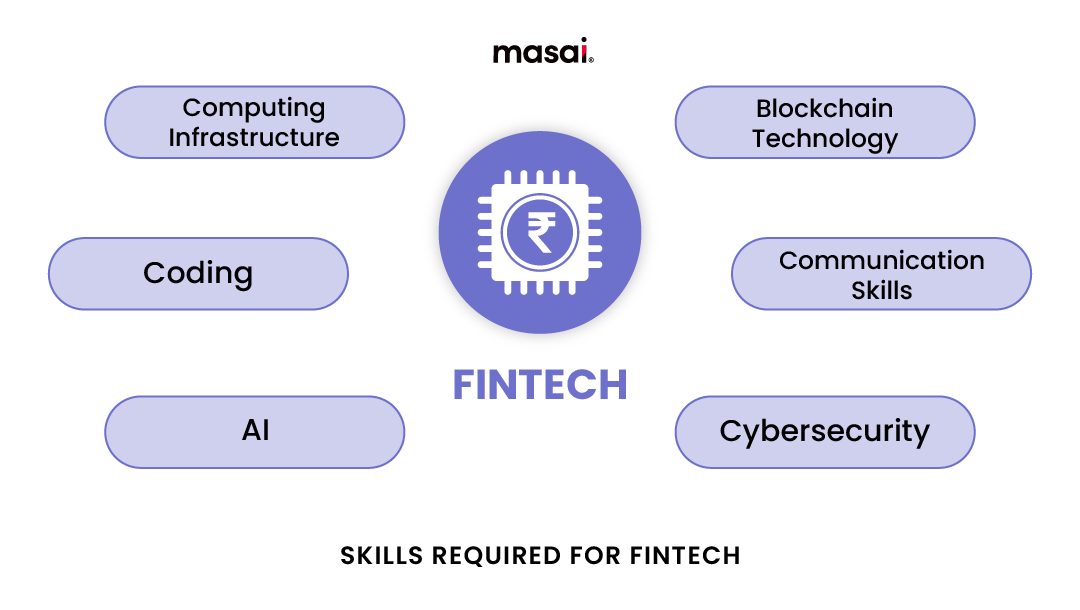
Skills required for FinTech
- Proficiency in Blockchain technology
- Knowledge of Artificial Intelligence
- Above-average coding skills
- Expertise in Cybersecurity
- Top-notch communication & collaboration skills
With the rise of Blockchain technology in finance companies and even talks of governments adopting decentralized banking in the near future, fintech engineers could very well be the pearls on a beach.
At present, the average salary of a fintech engineer in India stands at INR 7.5 LPA.
How to make the career switch
Now that you know about the main career paths to opt for, you need to get into the right headspace.
That's important because many a time we set up mental barriers to our own progress. If you've decided to go for it, there should be no two minds about it.
Thoughts like:
" I don't want to seem crazy"
" What if I'm not happy even in the tech industry"
" Will I be able to switch successfully?"
Should go out the window, and the focus should be on preparing a clear and concise roadmap.
Next step - Figure out the area of your interest. As we discussed above, there are multiple options at your peril. Whether you want to go for software development or data analytics, should absolutely depend on your aspirations and strengths.
You should ask yourself questions like:
"What are my knowledge gaps"?
"What skills do I need to build"?
"How would I become employable"?
Now, let's expand on these points further and make the situation even simpler for you.
Build Skills
If we overlook the college alternative (as most of you wouldn't be willing to pursue a 4-year degree again) we're left with two main paths - self-learning and skilling institutes.
There are plenty of self-learning resources online (recorded lectures and modules) to learn from, that also allocate certificates after you complete the course.
One thing you must keep in mind is that switching careers is nothing like switching channels on a TV or tabs on your laptop. It requires months, sometimes years of hard work and perseverance.
And even that might not be enough to crack the deal. You need structured and consistent learning. It’s important to understand your end goal.
Self-learning vs bootcamps
Yes, you can learn a big deal on your own but if your end goal is to kickstart a career in the tech industry, self-learning might not be the best option.
That’s where accelerated training programs like bootcamps and other skilling-focused institutes like Masai come into the frame.
They are, in most cases, perfectly customized to fit your needs. Accelerated learning, practical training, a well-structured curriculum, and cohorts of like-minded aspirants- all these qualities make these institutes the best place to build industry-relevant skills.
The problem with self-learning is that while a few students manage to organize their learning and progress consistently, a majority of them fall prey to the leeway and go down the slippery slope. Self-learning becomes on-my-time learning and that time starts playing tricks.
The best approach is to combine both these options- to join a structured learning program where you’ll also get the mentor’s guidance, and at the same time make the best use of resources available to you online to complement that.
Build Projects
Once you have a good understanding of the fundamentals, and you’re well versed with a programming language or a too, it’s time to start building projects.
Most students keep waiting for the right time until they feel fully confident about their skills, and the right time never comes. Whereas, in reality, you grow more as you implement your learnings into building projects. You might get stuck at times and feel clueless, but that’s the only way you’ll be able to refine your hard skills and get better at it.
By doing that, you’ll also be strengthening your portfolio by adding work samples, code, and websites, which will be your biggest asset when you apply for companies.

That’s the reason Masai has Construct weeks at the end of every unit, where aspiring developers work day in and day out to build real-world projects within a limited time frame. It sets them up in just the right way for their future jobs.
Leverage transferable skills
No matter where you've worked before or what level of skills you have in a particular domain, your transferable skills are still the biggest indicator of success in any field of work.
Transferable skills include:
- Communication
- Leadership
- Teamwork
- Presentation
- Problem-solving
Many professionals underestimate their ability for a particular domain but at the end of the day businesses in all sectors need people who can communicate and collaborate well, engage with the community, ably manage a team, etc.
So, while you're writing all those lines of code, you also need to embrace your portable skills.
Build Network
A good network has the potential to elevate your career from the bottom to the top. Networking with like-minded people will keep you updated, focused, and ambitious. You should connect with as many IT professionals as you can from various companies. In the best of cases, they can also be your referrers.
There are multiple ways to do that:
- Attending professional gatherings such as events, seminars, and conferences in your industry
- Building an online presence on LinkedIn and other social media platforms
- Creating and distributing tech-related content online via blogs or vlogs
In fact, companies like it when you have a personal brand. It showcases your drive and efficiency and creates a much deeper impact than a resume. (How to build your personal brand)
Connecting with the right people can open many doors for you when it comes to job search. A LinkedIn survey in 2016 suggested that 85% of job seekers find their jobs through networking. Now that’s a staggering number.
Final Thoughts
Are you ready to kickstart a tech career without having a tech background? It is definitely possible if you follow the right steps.
However, as we mentioned before, going through this journey alone can be an uphill task.
Rather, you should leverage the power of community, systematic learning, and step-by-step mentorship.
And you can do that by joining a skilling institute like Masai, where you get to learn in a tight schedule and connect with other students who are on the same path.
Currently, Masai offers full-time and part-time courses in full-stack web development and part-time course in data analytics. All our programs start at zero upfront fee and you only need to pay once placed at INR 5 LPA or more, else you learn for free.
Most companies today are overlooking degrees and hiring for skills, something which wasn’t comprehensible 10 years ago. You need to take advantage of this opportunity and get on the tech bandwagon while you can.
Cheers!

